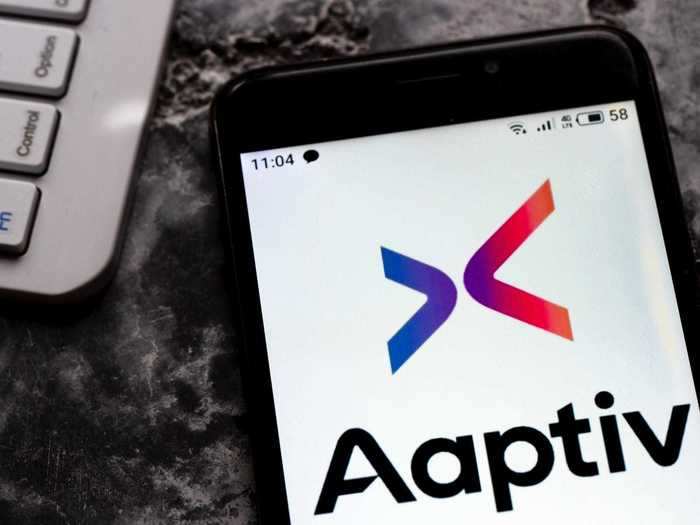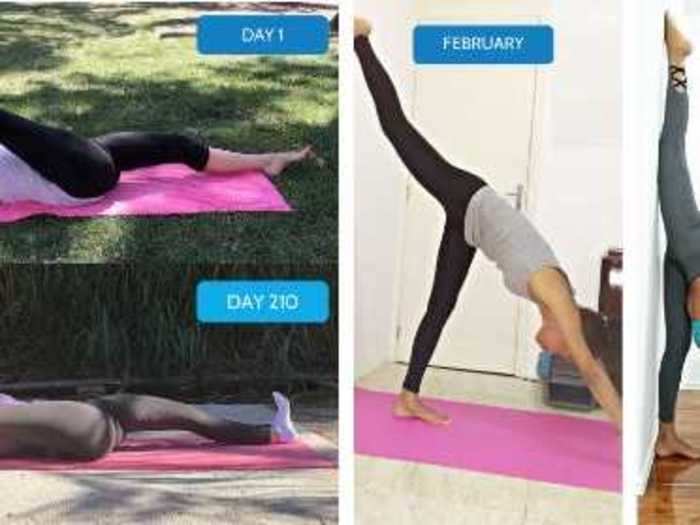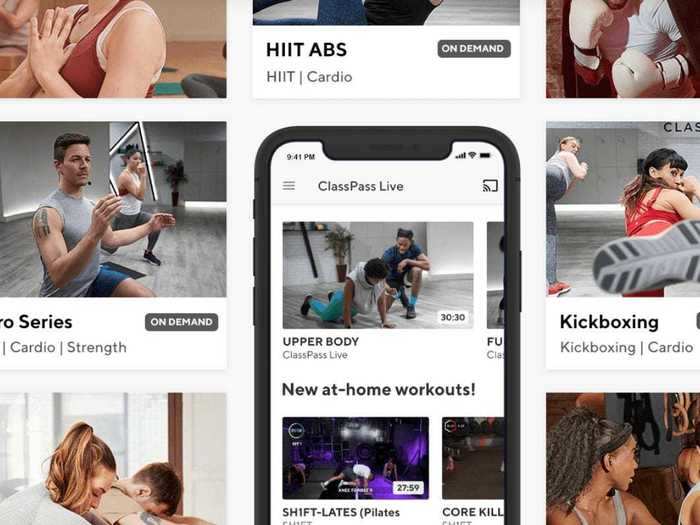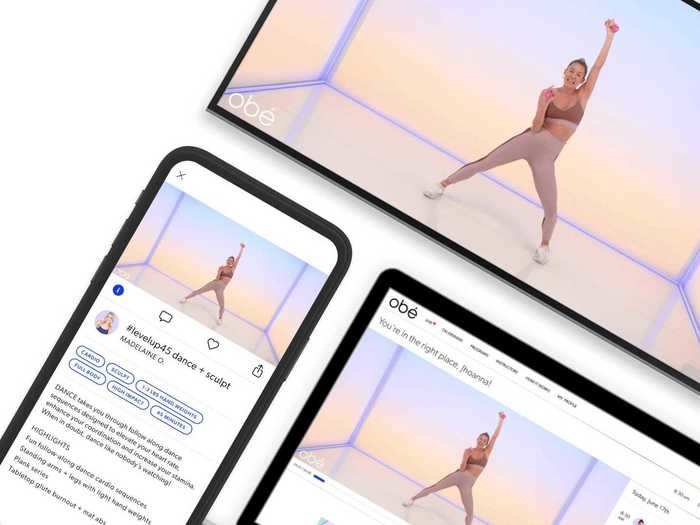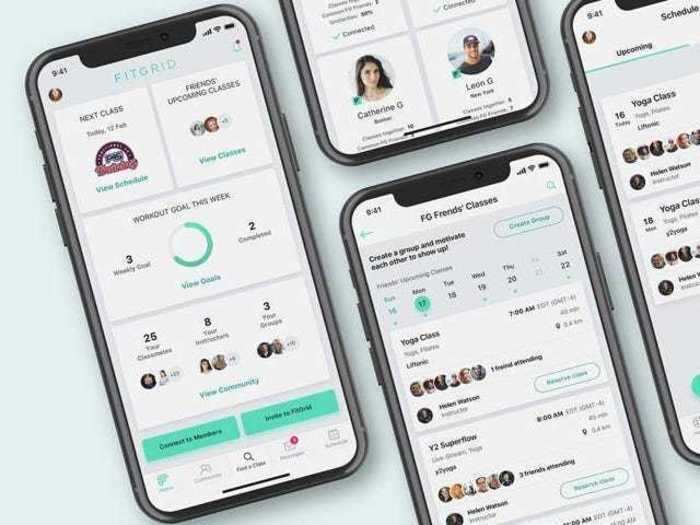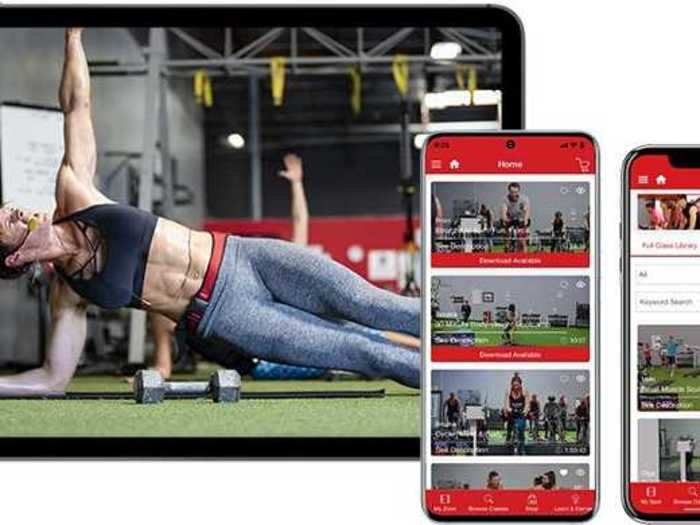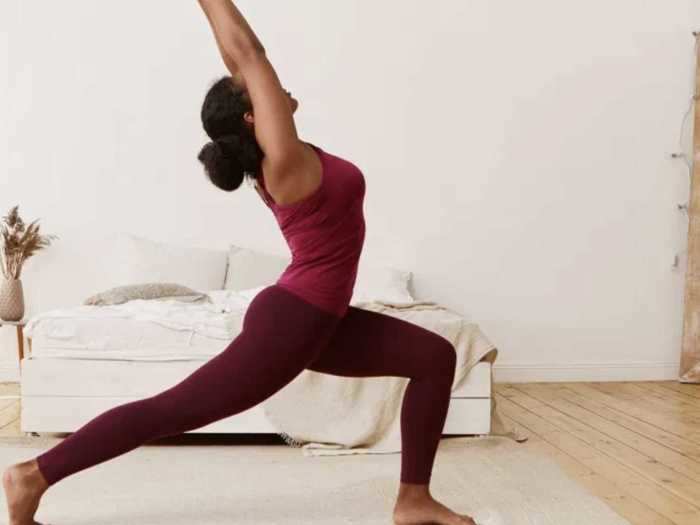The Obé fitness app.Obe
- On-demand and virtual fitness has never been more popular, as the pandemic drastically changes the way Americans stay fit.
- While Peloton continues to dominate the at-home fitness market, several digital fitness programs — both new and existing — are looking to cash in on the on-demand exercise boom.
- We took a closer look at 11 of the most popular virtual fitness membership programs.
Gone are the days of traditional gym memberships, as Americans enter the era of the virtual, at-home fitness movement buoyed by the pandemic.
On-demand fitness platforms have never been so popular, nor so ubiquitous. Though digital fitness has been on the rise in recent years, the coronavirus outbreak has put fledgling virtual companies on the map while prompting the rise of a slew of new platforms designed to help Americans stay fit while cooped up at home.
These programs vary in price and types of workouts, but most are designed to bring streaming fitness classes directly into living rooms, with little to no additional equipment required. And while past decades have brought the likes of Jane Fonda, Richard Simmons, and Billy Blanks into our homes, today there are more options and different types of classes at consumers' disposal than ever before.
The breadth of new options, however, hasn't stopped Peloton from dominating the virtual fitness market, with sales skyrocketing by 172% year-over-year and overwhelming demand for its stationary bikes causing mass delivery delays.
Companies ranging from tech giant Apple to StretchIt — an emerging app dedicated entirely to stretching — are vying for a piece of the at-home fitness market. We took a closer look at 11 virtual fitness membership programs looking to cash in on the at-home fitness boom.
Aaptiv
Igor Golovniov/SOPA Images/LightRocket via Getty Images
Aaptiv — which calls itself "the world's first audio fitness brand" — currently boasts more than 200,000 members. Each has access to unlimited monthly workouts ranging from strength training to yoga.
Unlike most of its digital fitness competitors, Aaptiv operates using audio only, with trainers that provide oral instruction across its 2,500 guided workouts. While it may not be for the more visually inclined, the company was designed to give harried Americans a break from staring at screens all day.
"Aaptiv's audio-based instruction and musical inspiration lets you move freely, focus on your form, and enjoy your surroundings," the company says on its website.
The company offers a 7-day free trial with memberships retailing for either $15 a month, or $100 a year.
StretchIt
StretchIt
Billed as a "low-intensity fitness app," StretchIt features video-based classes designed entirely for stretching. According to the company — which currently has more than 370,000 members — its workouts are open to all levels, "from stretching newbie to expert."
Though StretchIt was founded in 2016, it just launched a beginners training program in September as part of an effort to help users increase energy and relieve "work from home aches and pains." Its classes blend techniques from yoga, pilates, rhythmic gymnastics, bodyweight training, and dance, according to its website.
After a 7-day free trial, StretchIt has a $19.99 a month mobile-app only program, as well as a $25.99 membership that includes access to its desktop website.
Apple Fitness Plus
Apple
In September, Apple announced a new subscription fitness program that would feature streaming workouts instructed by "the world's best trainers" set to Apple Music playlists, according to the company. Apple Fitness Plus is slated to launch later this year, and will allow for up to five family members to use the program on a variety of Apple products including the iPhone, iPad, and Apple Watch.
The service will cost $9.99 a month or $79.99 a year, the tech giant said during its most recent product launch presentation.
ClassPass
classpass
ClassPass — best known for its flat-rate subscription program that gave users access to a variety of partnering studios and group classes — has managed to evolve into a digital fitness hub amid the pandemic
Quickly after the onset of the pandemic began shuttering gyms and fitness studios across the country, the company developed a live-streaming platform and cut a deal with its partners to virtually host classes while temporarily being spared the commission fee. Within just one month, ClassPass had 50,000 classes from 4,000 global studios available to its members.
"The ability to take a boot camp class with an instructor in Singapore or a yoga class with an instructor in LA whether you're in New York City or Missoula, Montana proved to be a really effective model," ClassPass CEO Fritz Lanman told Business Insider in September.
Glo
Glo
Previously known as YogaGlo, Glo is a personalized virtual yoga app with more than 4,000 classes for users off all skill levels. Since the company was first founded in 2008, it has amassed widespread popularity among fitness-enthusiasts thanks to its variety of yoga, meditation, and Pilates classes and its global network of instructors.
The connected app works across Apple and Android products, as well as connected TV devices like Roku and Amazon Fire TV. Glo offers a 15-day free trial and then a monthly membership for $18.
Obé
The Obé fitness app.
Obe
With an extensive catalog of on-demand classes as well as a robust live schedule of instructor-led fitness programs, Obé is designed for its users to "get fit, not bored," according to the company. The app includes a wide variety of categories including high intensity interval training, cardio boxing, barre, sculpt, and yoga, among others.
The app includes features like a personalized calendar for scheduling weekly workouts and long-term record tracking. After a 7-day free trial, the service is available for $27 a month, $65 every three months, or $199 annually.
FitGrid Class App
FitGrid
Launched just this Monday, the FitGrid Class App describes itself as a "social fitness" program that aims to merge social media with exercise. For FitGrid, a New York City-based tech startup that powers virtual workout classes on the backend, the effort is a way to monetize the curation streaming classes from its partners around the world.
According to FitGrid data, many Americans have stayed loyal to their favorite classes and instructors during the pandemic, even virtually, finding that studio loyalty has increased by 25%.
"Community has always been the holy grail of fitness. Now it is more important than ever before," Nt Etuk, FitGrid's founder and CEO said in a statement. "FitGrid is connecting everyone —the studios, the staff, the instructors and classmates — in one space."
Studio Sweat OnDemand
Studio Sweat OnDemand
Studio Sweat OnDemand is a Netflix-like hub for virtual fitness, where users can search by category for exercises ranging from core workouts and strength training to yoga and cycling for those with stationary bicycles. In addition to its comprehensive fitness library, the app also features live workouts for users that want to break a sweat with an instructor in real-time.
Studio Sweat OnDemand offers different tiered plans that are cheaper depending on how long you commit. A monthly membership goes for $19.88 a month, while the annual plan retails at $99 for the year.
Tone It Up
Tone It Up
Tone It Up, best known among the influencer and social media set, has a loyal following of young millennial women in favor of the company's comprehensive lifestyle content. The company was founded by Katrina Scott and Karena Dawn in 2009 as "the first fitness community that embraced positivity and empowered women."
In addition to its nutrition programs and wide array of merch, a Tone It Up membership — which is available for $14.99 a month, or $5 per month with an annual commitment — also features streaming fitness classes created by the company.
FitOn
FitOn
Developed by former FitBit executive Lindsay Cook, FitOn was designed to connect Americans with highly coveted celebrity trainers for free or at low-cost. The company offers an extensive array of free classes, as well as a premium membership starting at $19.99 that unlocks additional workouts, meal planning, and data tracking.
"Riding a Peloton bike is an amazing experience, but it costs over $2,000, and not everyone can afford that," Cook told Forbes in 2019. "So, what we really wanted to do was to democratize the fitness experience and make it so that any woman, no matter what real estate or workout equipment they have, could afford some fantastic workouts that they could do anytime, anywhere."
Keep
Keep
For the more advanced fitness buff, Keep offers personalized high-intensity training programs that integrate a full warm-up, workout, and cool-down session. The data-oriented company maintains detailed performance metrics tailored to specific goals so users can view progress in real-time.
While many workouts are available for free on Keep's mobile app, users can also opt for a premium monthly subscription that offers additional models and a yearly membership that features a personal coach.

